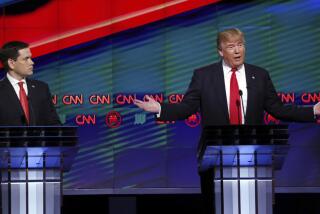Questions about the qualifications of Ted Cruz, the GOP’s newest star
Ted Cruz, the Republican Party’s newest star, hasn’t even officially won his seat in the U.S. Senate, and already there is speculation about a run for something bigger in 2016.
But could the circumstances of his birth get in the way?
Cruz, a tea party-endorsed Cuban American conservative, gave the party establishment a thumping in the Texas primary runoff on Tuesday. He’s a mortal lock to replace retiring Republican Sen. Kay Bailey Hutchison this November in the overwhelmingly Republican Lone Star State.
His resume — degrees from Princeton and Harvard and a stint as a Supreme Court law clerk to Chief Justice William H. Rehnquist — have led some to describe him as an “Ivy League Marco Rubio.” Like the Florida senator, who seems destined to become a future rival, Cruz can be an electrifying speaker.
His strongly conservative leanings and considerable personal talents, on top of his Latino roots, have made the 41-year-old an appealing overnight sensation among national Republicans, who are increasingly desperate for the votes of the country’s largest minority group.
However, Cruz’s personal story — son of an immigrant father who fled Cuba in the 1950s as a teenager with a modest sum of cash sewn into his underwear — includes a rather inconvenient fact: Cruz himself was also born outside the United States.
His parents were working in the oilfield region of western Canada when Rafael Edwards Cruz, later to become known as Ted, was born in Calgary in 1970.
That is already prompting questions about his qualifications for high national office. The Constitution states that only a “natural-born citizen” can be president.
Because he was born to an American mother, he’s a U.S. citizen, regardless of having a birthplace outside the country’s borders. But the issue of whether someone like him can also meet the requirements for the presidency has never been decided in court.
Over the years, a number of presidential candidates have had similar backgrounds. John McCain, the 2008 Republican nominee, was born in the Panama Canal zone. Mexico was the birthplace of George Romney, a 1968 Republican candidate and father of this year’s GOP nominee.
So far, no one has successfully challenged the qualifications of a presidential candidate born outside the United States. And while Cruz isn’t likely to get sidetracked for that reason, the issue isn’t totally off-the-wall and is likely to linger in the background as he continues his political climb.
Follow Politics Now on Twitter
Twitter: @PaulWestDC
More to Read
Get the L.A. Times Politics newsletter
Deeply reported insights into legislation, politics and policy from Sacramento, Washington and beyond. In your inbox three times per week.
You may occasionally receive promotional content from the Los Angeles Times.










